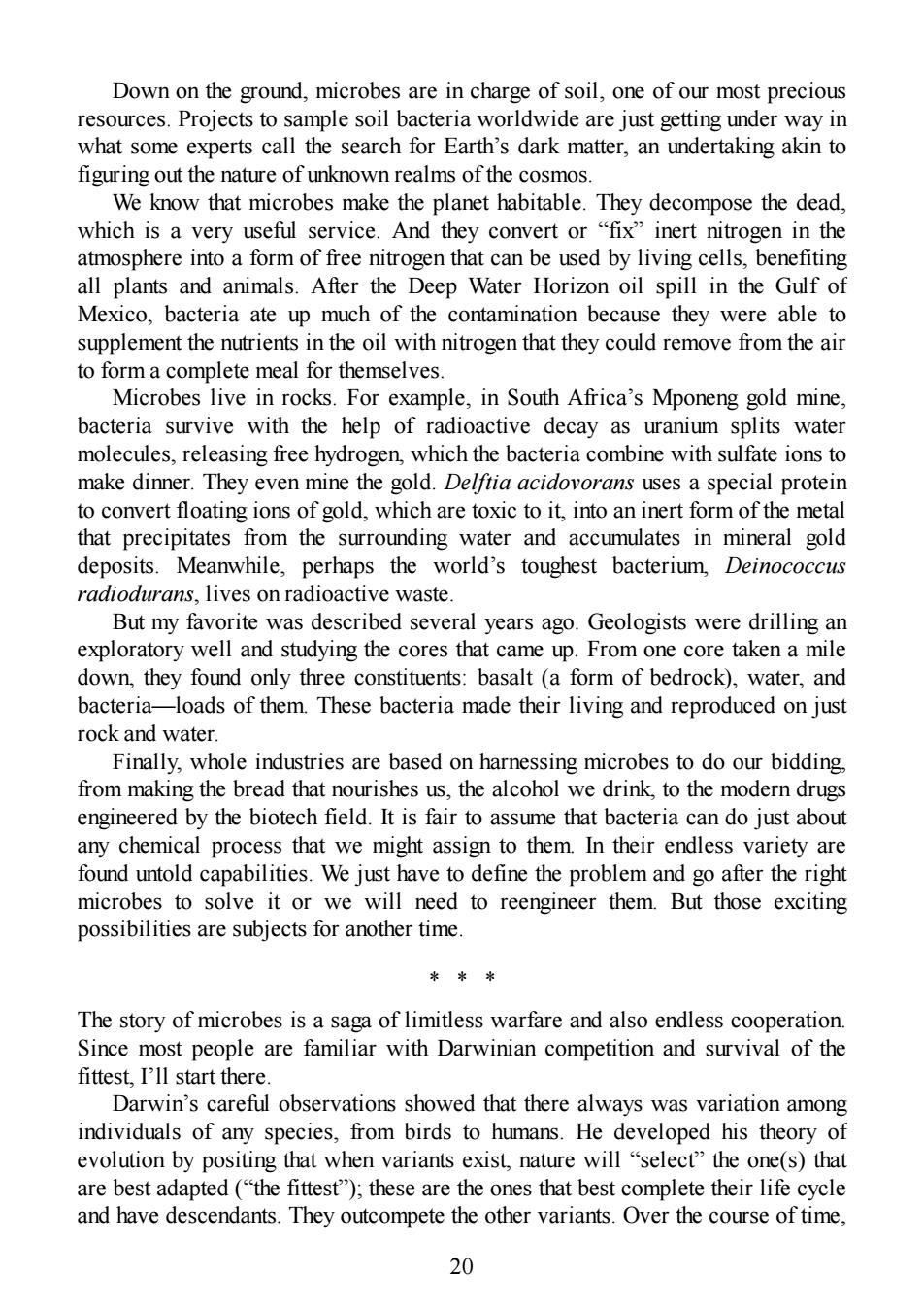正在加载图片...

Down on the ground,microbes are in charge of soil,one of our most precious resources.Projects to sample soil bacteria worldwide are just getting under way in what some experts call the search for Earth's dark matter,an undertaking akin to figuring out the nature of unknown realms of the cosmos. We know that microbes make the planet habitable.They decompose the dead, which is a very useful service.And they convert or "fix"inert nitrogen in the atmosphere into a form of free nitrogen that can be used by living cells,benefiting all plants and animals.After the Deep Water Horizon oil spill in the Gulf of Mexico,bacteria ate up much of the contamination because they were able to supplement the nutrients in the oil with nitrogen that they could remove from the air to form a complete meal for themselves Microbes live in rocks.For example,in South Africa's Mponeng gold mine, bacteria survive with the help of radioactive decay as uranium splits water molecules,releasing free hydrogen,which the bacteria combine with sulfate ions to make dinner.They even mine the gold.Delftia acidovorans uses a special protein to convert floating ions of gold,which are toxic to it,into an inert form of the metal that precipitates from the surrounding water and accumulates in mineral gold deposits.Meanwhile,perhaps the world's toughest bacterium,Deinococcus radiodurans,lives on radioactive waste But my favorite was described several years ago.Geologists were drilling an exploratory well and studying the cores that came up.From one core taken a mile down,they found only three constituents:basalt (a form of bedrock),water,and bacteria-loads of them.These bacteria made their living and reproduced on just rock and water Finally,whole industries are based on harnessing microbes to do our bidding, from making the bread that nourishes us,the alcohol we drink,to the modern drugs engineered by the biotech field.It is fair to assume that bacteria can do just about any chemical process that we might assign to them.In their endless variety are found untold capabilities.We just have to define the problem and go after the right microbes to solve it or we will need to reengineer them.But those exciting possibilities are subjects for another time. The story of microbes is a saga of limitless warfare and also endless cooperation. Since most people are familiar with Darwinian competition and survival of the fittest,I'll start there. Darwin's careful observations showed that there always was variation among individuals of any species,from birds to humans.He developed his theory of evolution by positing that when variants exist,nature will "select"the one(s)that are best adapted (the fittest):these are the ones that best complete their life cvcle and have descendants.They outcompete the other variants.Over the course of time 0Down on the ground, microbes are in charge of soil, one of our most precious resources. Projects to sample soil bacteria worldwide are just getting under way in what some experts call the search for Earth’s dark matter, an undertaking akin to figuring out the nature of unknown realms of the cosmos. We know that microbes make the planet habitable. They decompose the dead, which is a very useful service. And they convert or “fix” inert nitrogen in the atmosphere into a form of free nitrogen that can be used by living cells, benefiting all plants and animals. After the Deep Water Horizon oil spill in the Gulf of Mexico, bacteria ate up much of the contamination because they were able to supplement the nutrients in the oil with nitrogen that they could remove from the air to form a complete meal for themselves. Microbes live in rocks. For example, in South Africa’s Mponeng gold mine, bacteria survive with the help of radioactive decay as uranium splits water molecules, releasing free hydrogen, which the bacteria combine with sulfate ions to make dinner. They even mine the gold. Delftia acidovorans uses a special protein to convert floating ions of gold, which are toxic to it, into an inert form of the metal that precipitates from the surrounding water and accumulates in mineral gold deposits. Meanwhile, perhaps the world’s toughest bacterium, Deinococcus radiodurans, lives on radioactive waste. But my favorite was described several years ago. Geologists were drilling an exploratory well and studying the cores that came up. From one core taken a mile down, they found only three constituents: basalt (a form of bedrock), water, and bacteria—loads of them. These bacteria made their living and reproduced on just rock and water. Finally, whole industries are based on harnessing microbes to do our bidding, from making the bread that nourishes us, the alcohol we drink, to the modern drugs engineered by the biotech field. It is fair to assume that bacteria can do just about any chemical process that we might assign to them. In their endless variety are found untold capabilities. We just have to define the problem and go after the right microbes to solve it or we will need to reengineer them. But those exciting possibilities are subjects for another time. * * * The story of microbes is a saga of limitless warfare and also endless cooperation. Since most people are familiar with Darwinian competition and survival of the fittest, I’ll start there. Darwin’s careful observations showed that there always was variation among individuals of any species, from birds to humans. He developed his theory of evolution by positing that when variants exist, nature will “select” the one(s) that are best adapted (“the fittest”); these are the ones that best complete their life cycle and have descendants. They outcompete the other variants. Over the course of time, 20